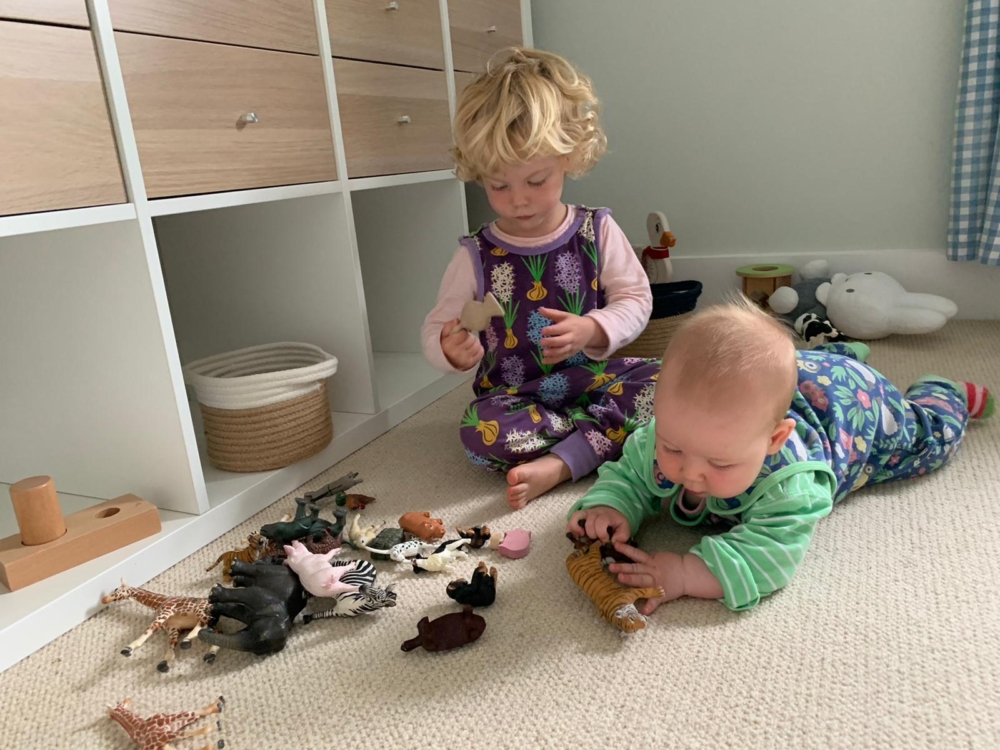When I first started writing about Poppy’s and Willow’s mobile adventures I did not imagine that within three weeks each one of them would be far beyond our expectations. Willow now sits with real confidence and manoeuvres her body in and out of sitting position with significant speed, whilst Poppy climbed a tree all on her own, without any adult help, and is able to judge her own safety and ask for help if she senses she needs it – this is a perfect example of self-risk-assessment. Accepting the children’s capacity to assess their own safety does not come naturally to most adults, especially us grandparents – particularly when we assume the loco-parentis role. However, in affording young children the opportunities to assess their own safety we are nurturing not only their sense of self and confidence but also their cognitive capacity to focus and be aware of the state of their body. A skill which will become very useful as the child grows and matures. By warning our children and grandchildren to be careful, by discouraging them from trying things because they may not be safe, we are drawing attention to the dangers rather than encouraging their curiosity and natural courage and sense of adventure. We need to trust children’s capacity to do things for and by themselves, and give them time to try out and practice these new skills. This is one of the guiding Montessori principles which should be applied both at home and at nursery and one to which I am sure I will return over and over again as I celebrate Poppy and Willow’s adventures through life.
From Crawling to Sitting and Standing
Willow has rapidly accomplished crawling, within a day the crab crawl enabled her to sit up and roll herself back into crawling position. She is now able to choose a toy from the low shelves which her mum organised for her in the dining and living room and also in the play room upstairs. She is beginning to show us her preferences for toys –the large knobbed puzzle of wild animals was the favourite yesterday, whilst the books of children’s faces attracted her attention today. I am a little sad that the treasure basket which was so favoured by her sister during the first and second year of life, has lost interest as Willow is learning to support her body on her feet – she is now pulling herself up! How long will it take for her before she is able stand on her own and then walk by herself?
Movement is the tool for holistic development
And whilst we admire these physical accomplishments I am reminded of the value they bring to her whole development! I am in awe of the speed with which connections in her brain are being made and experiences are logged in her memory –connecting with other experiences and enriching her cognitive capacity. The movements are being connected with smells, textures, tastes as well as sounds, shapes and colours. The opportunities to move freely and explore enrich her capacity to communicate her joy and frustration through her own unique sounds, which we have come to understand and respond to. Our prompt responses to her sounds and movements offer a sense of security, well-being and confidence that ‘her needs will be met by those around her’. And all of this is going happening as Willow is approaching the 8th month anniversary of being born – last January.
Montessori’s quote of following the child comes to mind, particularly as she links it with the child’s capacity to move:
Never mind, you get on my back and we will both get there. The child does not want “to get there” the child wants to walk, but his legs are disproportionate in size to ours and disproportionate to the size of his body, so we must not make the child to follow us, we must follow the child. The need to follow the child is clearly demonstrated here, we must remember that it is the rule of all education of children in all fields.
(Absorbent Mind –chapter 15 – Development and Imitation)
I would go even further by suggesting that rather than following we let young children lead their own learning. To be able to do this they will need our support – we need to keep them in mind when we are preparing and organising their environment and this means making the environment safe emotionally and physically. It is inevitable that as Willow and Poppy progress in their journey of exploration they will get hurt and frustrated, physically and emotionally, and they will need us to be there to comfort, hold and console, but never blame, undermine. As Philippa Perry puts it:
“… it is okay for your child to feel a whole spectrum of emotions, and they will, but they need to be kept company in all their moods, from tears to smiles and fears and anger”
Montessori M. (1949) The Absorbent Mind Chennai:Kalashestra Press
Perry P. (2019) The Book You Wish Your Parents Had Read (and Your Children Will be Glad That You Did) UK:Penguin Life

